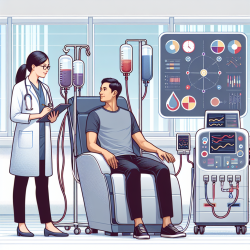Introduction
In the evolving landscape of medical education, there is a growing recognition of the importance of integrating global health into curricula. A recent study, "Implementing a Practical Global Health Curriculum: The Benefits and Challenges of Patient-Based Learning in the Community," explores the profound impact of patient-based learning compared to traditional lecture-based approaches. This research underscores the value of engaging medical students with real patients in community settings to enhance their understanding of global health issues.
The Case for Patient-Based Learning
Traditional medical education often relies heavily on lecture-based teaching, which, while informative, may lack the depth and context that patient interactions provide. The study conducted at the Medical School for International Health (MSIH) at Ben-Gurion University highlights the advantages of a practical curriculum where students engage directly with patients in their communities.
Data from the study indicates that students who participated in patient-based learning demonstrated a greater breadth and depth of understanding in global health topics compared to those in lecture-based courses. The thematic analysis of student assignments revealed that patient interactions fostered a more comprehensive grasp of the social determinants of health and inspired a commitment to patient advocacy.
Benefits of Community Engagement
Engaging with patients in their communities allows students to witness firsthand the social, economic, and environmental factors that influence health outcomes. This experiential learning approach encourages students to view patients as whole individuals rather than mere cases or conditions. By forming relationships with patients, students gain insights into the challenges faced by individuals in accessing healthcare and managing chronic conditions.
The study found that students who completed field journals and family health needs assessments developed a deeper understanding of their patients' lives, leading to more meaningful interactions and a stronger motivation to advocate for their needs. This approach not only benefits students but also contributes to the communities they serve by fostering a sense of social accountability and responsibility.
Challenges and Considerations
While the benefits of patient-based learning are clear, implementing such a curriculum poses challenges. Organizing placements, ensuring student safety, and managing logistical aspects require significant effort and resources. However, the study suggests that these challenges can be mitigated through careful planning and collaboration with community organizations.
Moreover, it is crucial to maintain a balance between student learning objectives and the needs and privacy of the patients involved. Ethical considerations, informed consent, and continuous feedback mechanisms are essential to ensure that the program is beneficial for all parties.
Conclusion
The research conducted at MSIH demonstrates that global health education is most effective when students engage directly with patients in their communities. This approach not only enhances students' knowledge and skills but also fosters empathy, advocacy, and a commitment to addressing the social determinants of health. As medical schools worldwide strive to produce socially accountable physicians, integrating patient-based learning into curricula represents a significant step forward.
For practitioners and educators, this study serves as a call to action to explore and implement patient-based learning opportunities. By doing so, we can better prepare future healthcare professionals to meet the complex challenges of global health.
To read the original research paper, please follow this link: Implementing a Practical Global Health Curriculum: The Benefits and Challenges of Patient-Based Learning in the Community.










